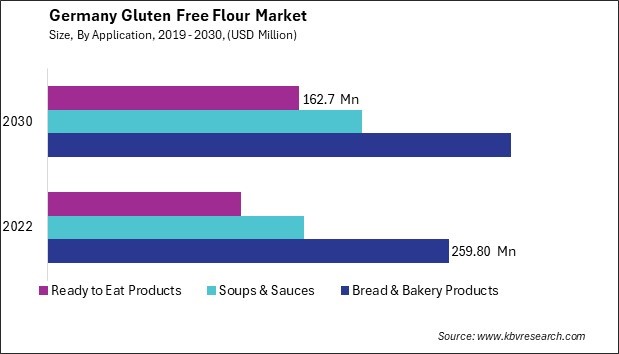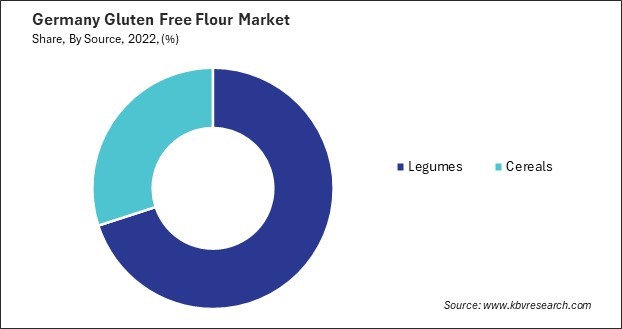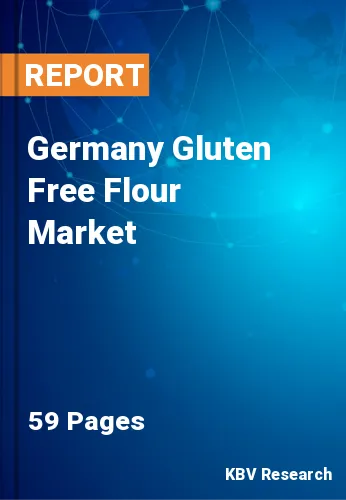The Germany Gluten Free Flour Market size is expected to reach $666.3 Million by 2030, rising at a market growth of 2.5% CAGR during the forecast period. In the year 2022, the market attained a volume of 67.0 Kilo Tonnes, experiencing a growth of 2.7 % (2019-2022).
In Germany, there has been a noticeable increase in the demand for gluten-free flour, reflecting a broader trend towards gluten-free diets and an awareness of celiac disease and gluten sensitivities among consumers. In recent times, there has been a notable increase in the supply and assortment of gluten-free flour products in response to the varied demands of consumers who desire gluten-free alternatives for reasons related to health, diet, or way of life.

A notable trend in the German gluten free flour market is the expansion of product offerings from both domestic and international manufacturers. This has led to a wider range of gluten-free flour options being available to consumers, including those made from alternative grains such as rice, corn, quinoa, and buckwheat. These advancements have expanded the options available to consumers in gluten-free cooking and baking, enabling them to experiment with an assortment of textures and flavors in their gastronomic endeavors.
Additionally, there has been a growing emphasis on the quality and nutritional value of gluten-free flour products in the German market. Manufacturers are increasingly focusing on developing gluten-free flours that mimic traditional wheat flour's properties and offer added nutritional benefits. This has led to the introduction of fortified gluten-free flours enriched with vitamins, minerals, and other nutrients, catering to consumers looking for healthier alternatives.
As more consumers become aware of the potential health benefits of reducing or eliminating gluten from their diets, there has been a surge in demand for gluten-free alternatives to traditional wheat flour. Naturally devoid of gluten, almond and oat flour are frequently employed in baking and cooking as alternatives to wheat flour, making them desirable alternatives for individuals seeking gluten-free alternatives.
Additionally, almond and oat flour are known for their nutritional benefits, which have contributed to their rising popularity in Germany. Oat flour is high in fiber and has a delicate, nutty taste, whereas almond flour is abundant in healthy fats, protein, and vitamins. These nutritional profiles make almond and oat flour attractive to health-conscious consumers looking for alternatives that offer added nutritional value.
Another factor driving the demand for almond and oat flour in Germany is their versatility in culinary applications. Both flour varieties are suitable for use in numerous baked goods, including cakes, cookies, bread, and pancakes, providing a gluten-free alternative. Their ability to mimic the texture and flavor of traditional wheat flour in many recipes has made almond and oat flour popular among consumers and food manufacturers. Therefore, as consumer awareness continues to grow and the demand for gluten-free options expands, it is likely that the popularity of almond and oat flour will continue to rise in the German market.
Germany has witnessed a notable increase in the demand for ready-to-eat (RTE) products, reflecting changing consumer lifestyles, evolving eating habits, and a growing preference for convenience. The growing prevalence of individuals leading fast-paced lives has led to an escalating need for convenient food options requiring minimal preparation. RTE products offer a quick and hassle-free solution for consumers looking to save time without compromising the quality of their meals, making them particularly appealing to urban professionals and families with busy schedules.
Another factor driving the demand for RTE products in Germany is the influence of global food trends and multiculturalism. As Germany continues to embrace a diverse range of culinary influences from around the world, there is a growing demand for RTE products that offer international flavors and cuisines. This has led to the introduction of a wide variety of RTE products inspired by global cuisines, catering to the increasingly diverse tastes of German consumers.
Furthermore, the COVID-19 pandemic has accelerated the demand for RTE products in Germany, as consumers sought convenient and safe food options during lockdowns and periods of restricted mobility. This has led to a greater appreciation for RTE products as reliable and convenient meal solutions that can be enjoyed at home, contributing to their sustained popularity even as restrictions have eased.
Additionally, the diversification of RTE product offerings has led to a greater variety of gluten-free options. Manufacturers of RTE products have responded to the demand for gluten-free options by developing new recipes and formulations that utilize gluten-free flour as a substitute for traditional wheat flour. This has expanded the range of RTE products available to consumers seeking gluten-free alternatives, contributing to the overall growth of the gluten free flour market in Germany. Thus, as RTE products continue to gain popularity, the demand for gluten-free flour is expected to remain strong, offering new opportunities for innovation and expansion in the gluten-free food segment.

In the German market, several companies have established a presence in the gluten-free flour segment, catering to consumers' growing demand for gluten-free alternatives. These companies offer a diverse range of gluten-free flour products made from alternative grains and ingredients, providing options for individuals with celiac disease, gluten sensitivities, or those seeking to incorporate gluten-free options into their diets.
One prominent German gluten free flour market player is Bauck GmbH & Co KG, a family-owned company specializing in organic and gluten-free products. Bauck offers a variety of gluten-free flours, including blends made from rice, corn, and buckwheat, catering to the diverse needs of consumers looking for gluten-free baking and cooking alternatives. The company is known for its commitment to organic and sustainable practices, which has helped it establish a strong presence in the gluten-free food segment in Germany.
Another key player in the market is Alnavit GmbH, a company that focuses on organic and gluten-free products, including a range of gluten-free flours. Alnavit's gluten-free flour products are made from alternative grains such as rice, millet, and quinoa, offering consumers a variety of options for their gluten-free baking and cooking needs. The company's emphasis on organic and natural ingredients has resonated with health-conscious consumers, contributing to its success in the gluten free flour market.
Dr. Schär AG / SPA is another prominent company in the German gluten free flour market, specializing in gluten-free foods and products for individuals with celiac disease. The company offers a wide range of gluten-free flour blends and baking mixes, providing consumers with convenient, high-quality options for gluten-free baking and cooking. Dr. Schär's focus on research and innovation in gluten-free products has positioned it as a leading player in the gluten-free food segment in Germany.
Furthermore, the German gluten free flour market includes domestic and international players, with companies from across Europe and beyond offering their products to German consumers. These companies often bring unique formulations and blends of gluten-free flour, catering to the diverse tastes and preferences of the German market.
Overall, the German gluten free flour market is characterized by a mix of established players with a strong focus on organic and natural ingredients, as well as international companies offering a variety of gluten-free flour options. Given the increasing demand for gluten-free products in Germany, the gluten free flour market will likely experience additional growth and innovation from established and emerging participants.
By Application
By Source
By Product
Our team of dedicated experts can provide you with attractive expansion opportunities for your business.

